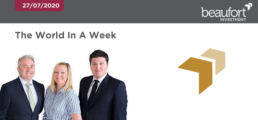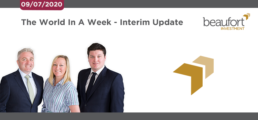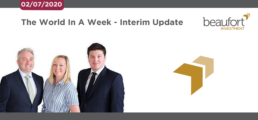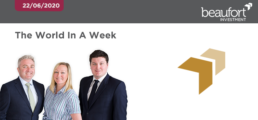The World In A Week – The Pain In Spain
The week started buoyantly with markets in a risk-on mood following positive news about vaccine trials and governments ordering doses of the vaccine in their tens of millions. However, this positive outlook slowly deteriorated throughout the week, as concerns over the US economic recovery became the main anxiety for markets.
With critical unemployment benefits due to expire at the end of the week and rising COVID-19 cases hitting 4 million, the US is looking less like the poster child for tackling the virus crisis. A rare press conference from President Trump admitting that things would get worse before they got better, highlighted this decrease in sentiment. To add to the woes for Donald Trump, we saw US/China tensions increase with retaliatory consulate closings.
Against this backdrop the majority of global equity markets slipped lower, with value outperforming growth for the second consecutive week. Meanwhile, safe haven assets such as US Treasuries and gold, edged higher.
In the UK, we were hit with the sudden exclusion of Spain from the travel corridor exemption list, with France also advising against travelling to parts of the country. Britons who have already travelled for their summer holidays will now be required to self-isolate, with a 14-day quarantine immediately imposed by the Government.
This has seen shares falling for airline and tourism companies, which have already been hit extremely hard during this unprecedented crisis. The uncertainty and confusion will undoubtedly be damaging for businesses and disappointing for those looking forward to a well-deserved break.
Any opinions stated are honestly held but are not guaranteed and should not be relied upon.
The information contained in this document is not to be regarded as an offer to buy or sell, or the solicitation of any offer to buy or sell, any investments or products.
The content of this document is for information only. It is advisable that you discuss your personal financial circumstances with a financial adviser before undertaking any investments.
All the data contained in the communication is believed to be reliable but may be inaccurate or incomplete. Unless otherwise specified all information is produced as of 27 July 2020.
The World In A Week - Interim Update
President Trump has finally confirmed that things will get worse before they get better, when he delivered an update on the coronavirus in the US. This is not new news, but it may stoke the fire of fear and, in turn, that could mean a negative economic response. That is why there was a meeting between the House of Representatives’ Speaker and the Treasury Secretary, to discuss the next fiscal stimulus plan.
This will be the fifth in the series of economic stimulus packages and it comes with a smidgen of urgency behind it. The additional unemployment benefit payments in the US are due to expire at the end of July. The fear is that the economy would not react well to a cessation of these important payments.
Any opinions stated are honestly held but are not guaranteed and should not be relied upon.
The information contained in this document is not to be regarded as an offer to buy or sell, or the solicitation of any offer to buy or sell, any investments or products.
The content of this document is for information only. It is advisable that you discuss your personal financial circumstances with a financial adviser before undertaking any investments.
All the data contained in the communication is believed to be reliable but may be inaccurate or incomplete. Unless otherwise specified all information is produced as of 23 July 2020.
The World In A Week - Simmering Tensions
Markets broadly remained in positive territory last week on the back of encouraging reports from vaccine trials. Data for the second quarter of this year demonstrated that the global contraction has been less severe than first feared. China, who was the first to reopen its economy, recovered faster than expected in June compared to the same period last year, with exports rising by 0.5% and imports by 2.7%.
This positive news was offset by political tensions between the US and China and the UK and China. Trade wars between the US and China continue to simmer in the background and the UK’s decision to ban all Huawei equipment from the UK’s 5G networks has also caused a backlash, with the media citing pressure from the US as the reason for the UK’s proposed ban.
Away from trade tensions, global virus deaths continue to climb with the US topping the list with 140,000 deaths. Some 30 States in the US have experienced an increase in cases in the last week, which has led to regional governors rethinking lockdown plans and, in some cases, backtracking on plans to ease restrictions.
The European Central Bank (ECB) met last week and left rates unchanged. European leaders’ marathon discussion, now in its fourth day, over the €750bn European Recovery Fund, remains in deadlock. There is a clear divide between the more frugal countries and those that are likely to be the biggest recipient of emergency funds. Discussions continue today.
Any opinions stated are honestly held but are not guaranteed and should not be relied upon.
The information contained in this document is not to be regarded as an offer to buy or sell, or the solicitation of any offer to buy or sell, any investments or products.
The content of this document is for information only. It is advisable that you discuss your personal financial circumstances with a financial adviser before undertaking any investments.
All the data contained in the communication is believed to be reliable but may be inaccurate or incomplete. Unless otherwise specified all information is produced as of 20th July 2020.
The World In A Week – Interim Update
We have had a series of data releases this week ranging from inflation, growth, industrial production, unemployment and retail sales. There was very little new news to be gleaned from the numbers; the consensus range was extremely wide, meaning there were no shocks to report.
The month certainly feels like a dead rubber, as the markets look towards the data releases in August, which will give us the numbers for the whole of the second quarter. Perhaps this will give us an indication of how effective the loosening in lockdown restrictions has been. It is expected that retails sales in the US will continue to grow, as the savings acquired in lockdown are treated like a windfall to consumers.
Any opinions stated are honestly held but are not guaranteed and should not be relied upon.
The information contained in this document is not to be regarded as an offer to buy or sell, or the solicitation of any offer to buy or sell, any investments or products.
The content of this document is for information only. It is advisable that you discuss your personal financial circumstances with a financial adviser before undertaking any investments.
All the data contained in the communication is believed to be reliable but may be inaccurate or incomplete. Unless otherwise specified all information is produced as of 16th July 2020.
Travel after COVID-19 - where to go and important things to remember
Guest Article by Neil Copeland, Travel Counsellors
Unprecedented Disruption
COVID-19 has caused massive disruption to the travel industry and has caused cancellation and disappointment for so many people as the world effectively shut its doors for the last 3 months.
It has been announced that the travel restrictions are being lifted with travel permitted to 60 countries. People are keen to get way – but where should you go to? Here is my list of the 8 best travel destinations to visit. In selecting these countries, I have considered how well COVID-19 was contained and the overall appeal the country offers.
My top 8 list of post COVID-19 countries to visit

1. Vietnam
Vietnam has recorded zero deaths from COVID-19. It is also an amazing country to visit. I suggest you undertake a multi-centre tour so you can appreciate the diversity that is offered. First you should visit Hanoi - a modern city that acts as the gateway to Halong Bay with its stunning rock formations. Then you would continue to the ancient city of Hoi An - a city full of historic character. From here you can relax at the beach in Danang before continuing to Ho Chi Minh City. Ho Chi Minh (previously Saigon) is a modern city for shopping. You can also visit the Cu Chi tunnels to learn about the Vietnam war. Vietnam offers diversity with many different aspects to be seen in one trip.

2. New Zealand
New Zealand was quick to lock down during COVID-19 and therefore managed to mostly protect its people. It is an amazing country to visit although you do need to allow at least 3 weeks to see everything. You can book organised tours or hire a motorhome, but my preferred way of seeing New Zealand is to hire a car and to plan a route staying in amazing boutique guest houses along the way. I usually start people on North Island for a week before transferring them to South Island for the next 2 weeks. A favourite stopover is Marlborough Sound and the Bay of Many Coves Resort. The diversity of scenery in New Zealand is huge and there is an abundance of wildlife to see.

3. Greece
Greece succeeded in restricting the deaths due to COVID-19 and I think that this was possible because it is partly an “island nation”. It is easier to restrict movement when travel is mostly by ferry or by air. I am a big fan of Greece having been visiting this wonderful country for 50 years. My last visit was to Paxos and I enjoyed the relaxed pace and taverna culture that this island offers. I often advise that the real Greece requires you to get a ferry so you can stay beyond the main destinations with airports, as by doing this you will find that slower pace of life.

4. Marrakech, Morocco
Another hidden gem that controlled COVID-19 well is Morocco. So if you fancy going to a country where you can stay in a buzzing and exotic city, go to the beach, go on eco trips to the mountains and ride a camel in the desert you should take a look at Morocco. A two-centre holiday to Marrakech and Agadir is ideal and this combines the culture of a buzzing city with the relaxation of the beach. The good news is that you can do all of this and it is only 3.5 hours away.

5. Croatia
Croatia had minimal COVID-19 deaths and is well worth considering for an escape this year. it is a relative newcomer to mass tourism and for this reason it keeps a certain charm and innocence compared to other countries whose tourism is more developed. One of my suggested destinations is Makarska because it offers secluded beaches and a relaxed nightlife. The other that I recommend is Porec as it has an ancient history with heaps of character in the old town, yet nearby are many wonderful beaches to enjoy. It is also possible to go on a day trip to Venice from here.

6. Mauritius
Mauritius is another island that succeeded in keeping COVID-19 largely at bay. I am a fan of Mauritius as it offers luxurious resorts with idyllic beaches. Dramatic scenery, amazing beaches and a combination of English and French influences make this a fascinating place to visit. People often think Mauritius will be expensive, but the prices are surprisingly good when you consider the high-quality accommodation you will stay in.

7. Malta
Another island that prevented COVID-19 establishing itself is Malta. Set in the heart of the Mediterranean Sea and fought over for centuries, Malta offers a melting pot of cultures and influences that are crammed into a relatively small island. With everything so easy to reach using the bus network to get around, this is an ideal short break destination.

8. Thailand
Thailand controlled the COVID-19 outbreak well. I had clients staying there when it broke out and they still managed to enjoy a great value exotic holiday. Thailand has wow factor! The hotels are affordable, but all try to offer a higher level of luxury than the other hotel down the road. If you fancy a hotel room in the trees with your own private pool, then Thailand should be one of the countries on your list. Best of all the prices for this luxury are surprisingly low!
Be careful how you book!
It has been well documented that some travel providers have not been very helpful in supporting their customers when their trips were cancelled.
Consider booking with a travel expert who will be available to help you if needed – especially important when a global event like COVID-19 happens! Check the financial stability of the company you plan to book with. You should also look to see how they care for you. Trust Pilot is useful to help you check this. There is an interesting article by Money Saving Expert which rated how companies did – you can see that by looking here: https://www.moneysavingexpert.com/news/2020/07/latest-travel-survey/
Try to book flights and hotels together as then an ATOL certificate is issued. See if a financial guarantee is offered (a trust fund that will protect your money). And always pay by credit card as you can get your money back from the card company if the trip is not provided for any reason.
I hope you feel inspired to set off and explore. It is worth remembering that travel is the only thing you buy that makes you richer!
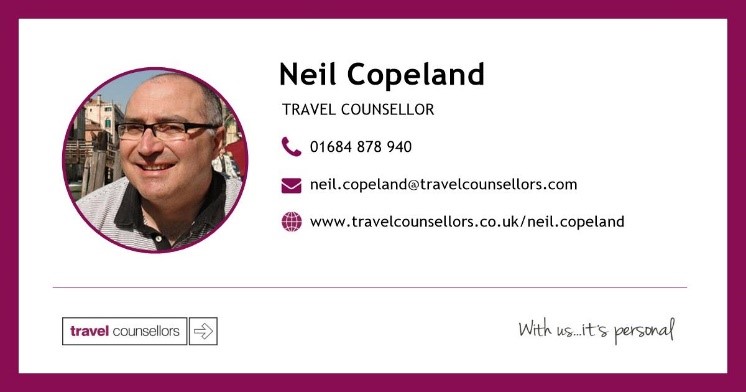
Neil Copeland runs his own business and offers 35 years’ travel industry experience. Working within the Travel Counsellors franchise he offers 100% financial protection and competitive prices.
He gives an expert and personal service for peace of mind when making dream travel arrangements.
The World In A Week - VAT's The Way Forward
Last week, the Chancellor, Rishi Sunak unveiled his latest plan to support the economic recovery. As the job-retention scheme begins to unwind, Sunak has pledged to protect the jobs of furloughed workers by offering a £1,000 bonus to companies who retain these workers on their books. He has also promised to fund the wages of new younger employees for the next six months. The combination of these measures taken will hopefully support the estimated 700,000 graduates and school leavers that are entering the uncertain job market this summer.
Aside from the job protection measures, Sunak has introduced methods of stimulating spending in the economy by proposing an “Eat out to help out” scheme which rewards people with a 50% discount for dining in restaurants and cafes. Furthermore, the cut to VAT in the hospitality and tourism sector is a measure aimed to boost the short-term consumption in the economy by taking advantage of the lower prices on offer. The stamp duty measures raise the threshold to £500,000 which will hopefully stimulate a resurgence in the housing market.
On the outset, the package of up to £30 billion appears significant in nature with policies clearly designed to reduce the rapid rise in unemployment. The deployment of this package remains devoted towards seeing out the interim and subsequently dealing with the financing of this additional expenditure at a later stage.
Meanwhile, cases of the coronavirus continue to increase with the World Health Organisation reporting a daily increase of 230,370 cases on Saturday and with the US reporting their highest daily increase to date. However, the recent spike in the number of US coronavirus cases seems detached from market sentiment as the S&P 500 continues to climb, returning +3.91% year to date in GBP terms.
Any opinions stated are honestly held but are not guaranteed and should not be relied upon.
The information contained in this document is not to be regarded as an offer to buy or sell, or the solicitation of any offer to buy or sell, any investments or products.
The content of this document is for information only. It is advisable that you discuss your personal financial circumstances with a financial adviser before undertaking any investments.
All the data contained in the communication is believed to be reliable but may be inaccurate or incomplete. Unless otherwise specified all information is produced as of 13th July 2020.
The World In A Week – Interim Update
Rather than the symbolic red briefcase, our Chancellor, Rishi Sunak, appeared to don a red outfit and played the part of Santa Claus in his summer statement yesterday. His £30 billion giveaway was firmly aimed at sustaining youth employment and helping low-income workers. We will give more details on his economic stimulus package in Monday’s ‘The World In A Week’.
The Great Firewall of China, which has extended its boundaries to encompass Hong Kong, is continuing to put pressure on the already stretched relationship between the US and China. The new law means China has control over Hong Kong’s internet, including censorship and potential arrests for managers of tech companies who refuse to hand over data on their users. This poses a dilemma for some of the largest US tech firms who may have to abandon their operations in Hong Kong.
Trump’s reprisal was confirmation that a ban on the video app ‘TikTok’ is being considered, which would be devastating to the youth in the US, but also gives rise to the fact that specific companies are now being targeted in this increasingly tense political environment. Media reports that the US is considering undermining the Hong Kong dollar’s peg to the US dollar, makes the US-Sino cold war that little bit chillier and adds more credence to the theory that Trump will be using his tough stance on China in his election campaign.
Any opinions stated are honestly held but are not guaranteed and should not be relied upon.
The information contained in this document is not to be regarded as an offer to buy or sell, or the solicitation of any offer to buy or sell, any investments or products.
The content of this document is for information only. It is advisable that you discuss your personal financial circumstances with a financial adviser before undertaking any investments.
All the data contained in the communication is believed to be reliable but may be inaccurate or incomplete. Unless otherwise specified all information is produced as of 9th July 2020.
The World In A Week - Getting Back to Business
Markets finished last week in an ebullient mode overall which saw MSCI ACWI rising +2.1% in Sterling terms. This was aided in particular by a strong rise in Chinese Equities which jumped +3.9% for the week as investors became more cheerful about a swift economic recovery from the Coronavirus pandemic. Investment grade Fixed Income was flat, while High Yield Bonds returned +0.3% and Global Investment Grade Credit continued to outperform Sterling IG Credit. The Pound Sterling also strengthened against the Euro and the Dollar.
Saturday, the 4th July was not only Independence Day in the United States, but also the day on which the inhabitants of the UK began to regain at least some of their liberty as the economy began to reopen. Attention now turns to the Chancellor of the Exchequer, Rishi Sunak, and his economic statement in Parliament on Wednesday. He is expected to outline the Government’s programme for restarting the economy following the lockdown. Among the measures that are allegedly being discussed, is the offering of a payment of £1,000 to companies for every trainee provided with a work experience placement. There is also the possible offering of a £500 voucher to all citizens to spend in designated parts of the economy that have been particularly badly hit, as well as a proposal to raise the threshold at which homebuyers start paying stamp duty to £500,000.
Any opinions stated are honestly held but are not guaranteed and should not be relied upon.
The information contained in this document is not to be regarded as an offer to buy or sell, or the solicitation of any offer to buy or sell, any investments or products.
The content of this document is for information only. It is advisable that you discuss your personal financial circumstances with a financial adviser before undertaking any investments.
All the data contained in the communication is believed to be reliable but may be inaccurate or incomplete. Unless otherwise specified all information is produced as of 6th July 2020.
The World In A Week – Interim Update
Should I stay or should I go (out)? The Clash here is the interminable quandary between stemming the spread of COVID-19 and resuscitating economies. Decisions have to be made without full clarity of the potential outcomes and are typically counter-productive to each other; what is good for the economy is not necessarily good for controlling COVID-19.
Chairman of the US Federal Reserve, Jerome Powell, has indicated that the central bank will be more explicit in its intentions, in order to help facilitate a better recovery. However, while the reopening of the US economy is underway, a full economic revival would require curbing COVID-19’s current trajectory. This warning was echoed by the World Health Organisation as COVID-19 cases passed 10 million globally. Over a quarter of those were from the US, which was particularly evident this week as California, Texas and Arizona all reported an increase in the number of cases. This has meant several states slowing down their plans for an easing of lockdown measures.
The UK seems to be following the US, with isolated spikes in particular areas requiring a reinstatement of localised lockdowns. The path towards normalisation will be volatile and until a vaccine is found, investors will have to become accustomed to a strategy that is two steps forward and one step back.
Any opinions stated are honestly held but are not guaranteed and should not be relied upon.
The information contained in this document is not to be regarded as an offer to buy or sell, or the solicitation of any offer to buy or sell, any investments or products.
The content of this document is for information only. It is advisable that you discuss your personal financial circumstances with a financial adviser before undertaking any investments.
All the data contained in the communication is believed to be reliable but may be inaccurate or incomplete. Unless otherwise specified all information is produced as of 2nd July 2020.
The World In A Week - Seasons of Change
Following on from last week’s opening of some non-essential businesses, it is likely that Boris Johnson will announce a relaxation of the 2-metre social distancing rule tomorrow. This should pave the way for a potential reopening of the hospitality sector from the 4th July.
Whilst the recommencement of the Premier League has been met with mixed reviews, the lack of atmosphere may be more palatable while enjoying the spectacle with a cold beverage of your choice, in the reasonably close proximity of your friends.
The attraction of socialising once again may not be enough to help the beleaguered sector, that is why Chancellor Rishi Sunak is contemplating a move to potentially reduce VAT for the hospitality and tourism sectors, which would include pubs, restaurants and hotels, from as early as July.
However, in order to balance the books, it is likely that the summer of stimulus may give way to an autumn that contains deferred tax increases and spending cuts in order to stabilise public debt.


